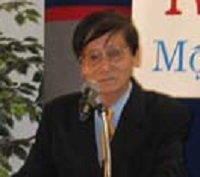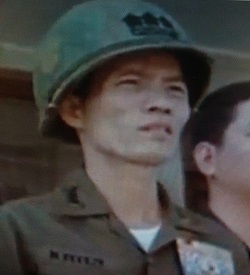
1st Infantry Division
The Biographic Data on MG Nguyen Van Hieu prepared by the American Embassy wrote:
9. On August 13, 1963, Hieu was appointed Chief of Staff of the 1st Infantry Division. The Commander of the Division at that time was Do Cao Tri, who had attained the rank of BG. Tri became the Commander of I Corps/MR-1 a few days later, but also retained command of the 1st Division for a new commander of the Division was not named until December 12, 1963, when Tri became the Commander of II Corps/MR-2.
10. As Chief of Staff of the 1st Division, Hieu was the senior officer in command of the troops at Hue during the overthrow of Diem in 1963. By his account, Tri kept him in the dark about the coup until after it was in progress.
LTC Duong Dien Nghi recounts:
A couple of months at the helm of 1st Infantry Division, Colonel Do Cao Tri appointed Major Nguyen Van Hieu, Head of G3/I Corps, to be his Chief of Staff in replacement of Lieutenant Colonel Nguyen Ho. Not long after Major Hieu arrived at the 1st Infantry Division, the controversial affair of Buddhist flag display on the occasion of Buddha Birthday occurred (in May 1963). Buddhist activists demonstrated in front of Hue Radio Broadcasting Station that night and carried on their struggle, and people's livelihood had been constantly disturbed.
In the beginning, local authorities (Province and Sector) dealt directly with the issue and attempted to restore normalcy. But progressively the situation was spinning out of their control, and the Central Government gave to the Commander of the 1st Infantry Division/11th Military Region full authority to restore order and security in Hue.
This was the first major event happening under the 1st Republic of Vietnam and also the first time the Army was directly involved in dealing with the situation.
We called this mission a psychological, cultural, intellectual warfare. Both sides used megaphones and mass media to exchange words in aiming to win the public opinion and to defeat propaganda of anti-government elements and local Communist instigators.
Colonel Do Cao Tri met with his General Staff to map out a plan of action; and my role in Psychological Warfare was considered as the main force with the collaboration and support of G2, G3, G4, Military Security; and the Division Commander gave Major Hieu and me full latitude and discretion in carrying out the plan.
Besides local forces and means, like the Psychological Warfare Company, Hue Radio Broadcasting, Thua Thien Information Bureau, Information Inspection Bureau, the Saigon Authority attached to the Division a few Psychological Warfare counter-intelligence groups that infiltrated the population, etc. I worked closely with Major Hieu and knew him well since then.
The situation was getting critical by the days. Hue University's students who were Communist sympathizers had shown their faces, under the direction of Venerable Tri Quang of Tu Dam's pagoda; and intelligence gatherings indicated that Communist moles had infiltrated the population which was following the Buddhist struggle to their advantages.
On many occasions, Major Hieu and I stayed up all night to solve urgent issues. Student groups instigated here held a meeting in pagodas there. Furthermore, Hue was the crib of Buddhism and exerted significant influence.
Although very busy and under stress, Major Hieu always exhibited calmness and self-confidence. I followed him in fulfilling our job to the point of skipping meals and sleeps. Many nights, he sat alone in his office; I offered him to have movies shown as entertainment, but he gently said: "Let's wait until we finish our task; if we watch movies now, we would disturb the sleep of soldiers who had to stay overnight in the base camp."
He was always delicate in his dealings with others; he never uttered harsh words; he never showed his displeasure to anyone. At noon, he lunched at the officers' canteen; in the evening, he only went home for an hour to have dinner and came right back to his office, working at his desk with a folding-bed and a small radio to keep abreast with the news next to him.
Every morning, I presented to him and the Division Commander the local and global news briefs on Vietnam issues, and issues happening in Hue. He expressed reservation, doubt; but he advised me to hold firm, not to be overly concerned when the army must follow superiors' orders.
One time, he told me to seek an opinion from American advisors concerning Buddhist issues happening in Hue. I looked for an opportunity to talk to the Captain advisor sharing the office with me. He said half serious half-joking that I should be the one to provide him with advice in this case. I understood his meaning and reported back to Major Hieu and Colonel Commander. Both just smiled.
Colonel Do Cao Tri used to warn me to be careful in writing editorials for radio and in composing flyers to be distributed to the public, and to consult with Major Hieu in all matters. One time, he dispatched me to Tu Dam pagoda to conduct negotiations with the monks on the matter of water and electricity discontinuation. I went to Major Hieu and suggested that my ranking was too modest, and a higher ranking officer should be sent instead, with me as an aide. Major Hieu told me not to worry, "The Colonel trusts you; you have the authority to deal with the Venerables and the like. It is our task, but be careful not to let them hold you hostage, which would complicate the matter; and don't forget to notify troops on duty in the vicinity before you go…"
Major Hieu took care of all aspects of his task every day. He entertained local as well as foreign press groups. He conducted his press conference with impeccable English. I knew he was also fluent in French, Mandarine and even German. He was very diligent, pleasant and very discipline. captain and lieutenant officers like us at that time looked up to him as our idol to be emulated. Crew cut head, impeccable uniform, friendly with rank and file alike; he was also simple in eating. He did not smoke. It seemed that he did not exhibit any specific overt interest.
The implementation of the action plan succeeded in forcing the protestors into retreat. The situation seemed calm by 9/1963, and Colonel Tri was promoted to Major General as a result. However, approximately two months later, on 11/1, a major event occurred. President Ngo Dinh Diem and his brother were assassinated. The Military Junta governed the country. Hue Buddhists seized the opportunity to claim credit in the overthrow of Diem regime, and attacked main players in the 1st Division; those they called "oppressors of Buddhists". Once again, I had to deal with the situation. The Central Government added another assignment to my portfolio: Director of Hue Radio Broadcasting Station.
The Central Directorate of General Officers promoted General Do Cao Tri to Lieutenant General. Major Hieu, Chief of Staff, was promoted to Lieutenant Colonel; Captain Ton That Khien, G3 Head, to Major; and I, Lieutenant to Captain.

Dương Diên Nghị
Tôn Thất KhiênLieutenant General Do Cao Tri went to Saigon to meet with the Directorate of General Officers. At the Division, LTC Hieu unbuttoned his Major insignia from his shirt and buttoned it onto Ton That Khien. Ton That Khien unbuttoned his Captain insignia and buttoned it onto me. We all did not feel happy getting these new grades that were rather belated. LTC Hieu remained pensive. Major Khien and I, were thinking about the drama of the 1st Republic of Vietnam, about its fall and felt sad for President Ngo Dinh Diem and his advisor Ngo Dinh Nhu. Hue University's students and Buddhists still focused on us with their accusations; in particular me, the most vehement oppressor of Buddhists although I had not to resort to force and violent tactics. I again had to deal with those thorny and complex innuendos; nevertheless, I had gained unforgettable numerous beneficial lessons.
Despite the fact the Revolutionary Central Committee had taken hold of the government, the situation in Hue still seemed to be unstable; and when Lieutenant General Do Cao Tri was ordered to take over the I Corps Command in replacement of General Le Van Nghiem, he requested that LTC Hieu be promoted to Colonel and appointed 1st Infantry Division Acting Commander and Major Khien to LTC and 1st Infantry Division Chief of Staff. This special promotion took place around three weeks after the military coup.
Remark: Instead of “around three weeks after the military coup”, it was more likely “around three days after the military coup”, since my brother left the 1st Division on 11/11/1963 for another position elsewhere.
According to the two documents above-mentioned, my brother did not seem to approve the coup against President Diem:
As Chief of Staff of the 1st Division, Hieu was the senior officer in command of the troops at Hue during the overthrow of Diem in 1963. By his account, Tri kept him in the dark about the coup until after it was in progress.
We all did not feel happy getting these new grades that were rather belated. LTC Hieu remained pensive. Major Khien and I, we were thinking about the drama of the 1st Republic of Vietnam, about its fall and felt sad for President Ngo Dinh Diem and his advisor Ngo Dinh Nhu.
When General Do Cao Tri was promoted to I Corps Commander to replace General Le Van Nghiem on August 21, 1963, he left the 1st Division located in Hue and went to Danang, but he still held the command of the 1st Division concurrently with his new post. He had Major Hieu promoted to LTC and made him interim 1st Division Commander (a fact not many people were aware of). On November 3, Colonel Tran Thanh Phong was officially nominated 1st Division Commander. There is also another fact that very few people know – even the American Embassy’s document cited at the beginning of this chapter said it wrong - is: where did my brother go and do afterward? This question will be answered in the next chapter.
Nguyen Van Tin
10 January 2015